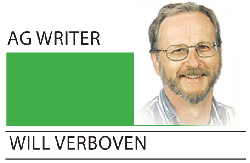US Presidential elections have caused outbreaks of trade anxiety in many Canadian industry sectors – agriculture being one of them. One anxiety is that no matter which candidate wins, neither will be favourable towards Canadian export trade interests. Sure, their trade attitude is based on US politics and the business of getting elected, and it may be directed more toward China than Canada. Still, as the previous Trump administration has shown, Canada gets caught in the crossfire. When that happens, the Canadian government panics and launches an intense lobbying campaign to cut Canada out of any US trade war. A recent example was when the Trump administration imposed high tariffs on aluminum and steel imports. That tariff seemed unfair to Canada, considering how integrated those metal-related industries are between our two countries. However, Canada wasn’t an innocent bystander – cheap Chinese aluminum and steel imports into Canada undermined the US/Canada metal business. The subsequent Canadian exemption from the US tariff happened only after Canada imposed similar tariffs on Chinese imports. One wonders if it wouldn’t be easier if Canada and the US coordinated their tariff imposition so we don’t repeat these incidents. Shouldn’t such tariff coordination be harmonized under the CUSMA (Canada/US/Mexico (free trade) Agreement)? The European Union (EU) operates that way to its advantage, giving them a big stick when negotiating free trade agreements.
The US Biden administration is seen as an ideological kindred spirit by the present federal Liberal government. However, perhaps to their chagrin, the Biden administration has shown religious zeal towards protectionism with their buy US-made policy, which primarily affects industries in central Canada, the Liberal government’s political heartland. That approach is sure to be intensified if Democrat candidate Kamala Harris, who is supported by the majority of protectionist American unions, is elected. I expect Canadian agriculture producer groups to be on high alert, contemplating the possible consequences of the US election on their sectors. The Canadian Cattle Association (CCA) has a long history of dealing with US trade and border mischief, particularly the Country of Origin Labelling (COOL) issue. I expect that issue will be instigated into resurrection by anti-Canadian trade lobby groups like the notorious R-CALF. The latter is a politically shrewd group – associating itself with progressive consumer groups to get the attention of Democratic administrations and using its rural Trump-friendly base to appeal to Republican administrations. The CCA does have the support of the US National Cattlemens Beef Association (NCBA) when it comes to trade policy. They are quite aware that restricting cattle and beef imports into the US could have a retaliatory impact on US beef exports. But let’s face it – regardless of which US administration is in power, the political and patriotic lure of boosting American-grown/made food is irresistible to American politicians.
The big issue for Canada will be the renewal of the CUSMA free trade agreement in 2026. The best outcome for Canadian agriculture will be no unwelcome changes to the treaty for the industry. But alas, that may be wishful thinking; US trade negotiators will want to discuss Canadian supply management and dairy/poultry import quotas and tariffs. The approach to that issue will depend on which party is the government in both Canada and the US. In Canada, the federal Liberals (and all provincial governments) are committed to maintaining supply management at trade talks. That will be problematic with a possible new Trump administration who pursued the issue during the previous CUSMA negotiations. Perhaps a new Canadian Conservative government will have a more nuanced approach to the supply management issue at upcoming trade talks to lessen the US determination to see it eliminated. However, the dairy producers’ lobby war machine stands ready if any Canadian government waivers.
If Harris is elected her administration is bound to become more progressive and strident about saving the planet. She will probably insist on severe environmental standards, restrictions, goals, etc., being inserted into a new CUSMA trade treaty. One expects carbon taxes on cattle, herbicide restrictions, nitrogen reductions and worse to be topics of discussion. In that progressive green approach, the Harris administration will have the support of the new progressive leftist President, Claudia Sheinbaum of Mexico, the other partner in CUSMA. She is a past Mexican secretary of the environment. Add in green-obsessed Trudeau, and we could see North America being ruled by a progressive-left-green troika. Now there is a terrifying thought for Canadian and North American agriculture. Interesting times are surely coming.
Will Verboven is an ag opinion writer.
Welcome!Log into your account









